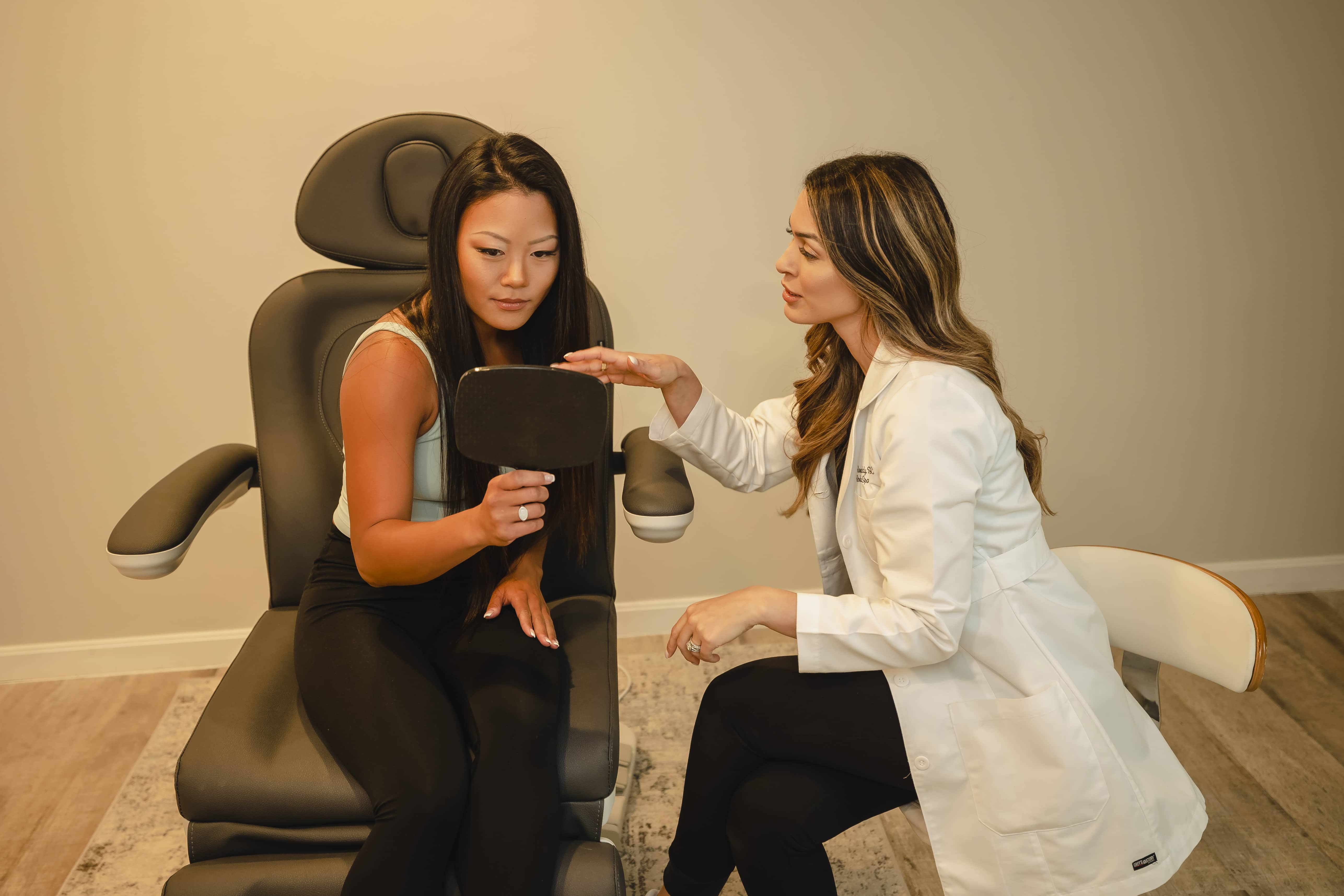Everything You Need To Know About Botox

Got injection jitters? Read this ultimate guide to Botox.
Not too long ago, hearing the word “Botox” would rouse images of middle-aged women unable to make even the most basic of facial expressions—so much so it became a running joke in pop culture (Jennifer Coolidge, we’re looking at you). Now, Botox isn’t something you hide from your friends. It’s something you tout, namely the fact that you can hide it—despite your newly glass-smooth skin.
With that said, given that Botox is a foreign substance introduced into your body by way of needle, it’s understandable to have a litany of questions and concerns. We get it. This is a face-altering treatment. If we weren’t the experts, we’d be giving us the third degree, too.
Ahead, find out what exactly you’re getting yourself into and more importantly, what benefits you’ll be getting out of it.
What Is Botox?
First, let’s get scientific. Also known as Botulinum toxin Type A, Botox is a neurotoxic protein produced by the bacterium Clostridium botulinum. And yes, it’s technically toxic, but don’t be alarmed. This substance is FDA-approved and government-regulated for safety and efficacy in smaller doses, which is what you need for aesthetic purposes.
Also, keep in mind that anything in copious quantities is harmful to your body, not just things that are labeled as toxins!
What Are the Beauty Benefits of Botox?
For cosmetic purposes, Botox is most popular and widely used to minimize and prevent the appearance of fine lines and wrinkles. Most people like to target the horizontal lines that form on their foreheads, as they’re often the most noticeable (and seem to come out of nowhere!).
Botox also temporarily improves both moderate to severe crow’s feet and eleven lines (those vertical lines between the brows) in adults.
It’s also often used for a “lip flip” procedure, in which the substance is injected around the cupid’s bow of your mouth to make lips look naturally fuller—without the need for lip fillers.
How Does Botox Work?
We all know that wrinkles naturally occur as we progressively lose collagen and elastin, two proteins in our skin responsible for keeping our skin firm and bouncy. But wrinkles are also formed (or in many cases, expedited) through repeated smiling, frowning, and squinting.
If you let nature take its course, these muscles will continue to move in the same pattern day after day, which will cause the wrinkles to get deeper and deeper. Botox helps slow this process down. By relaxing certain targeted muscles, Botox prevents the contraction of those muscles. Less movement means smoother-looking skin.
For lip flips, Botox relaxes the muscles located on the edges of your upper lip, which makes your lip “flip” upward ever so slightly, creating the illusion of a poutier pout. Genius!
What Are Some Other Uses For Botox?
Remember how we said Botox is generally safe to use in small doses? Because side effects are typically minimal or nonexistent, doctors also use Botox to eliminate excessive sweating in the hands, feet and underarms, reduce migraine headaches, treat overactive bladders, and alleviate the symptoms of TMJ.
How Long Does Botox Last?
After your Botox is administered, you’ll notice gradual improvements within 7 days, with full-blown social-media-ready improvements in 14 days. The newfound smoothness will typically last about 3 to 4 months after your first treatment. The good news? Each subsequent injection enables the results to last longer, sometimes as long as 6 months depending on your lifestyle habits, age, and skincare regimen.
How Do You Prolong the Effects of Botox?
Although you can’t extend your Botox results by, say, a whole year, you can definitely adopt some Botox-friendly habits so it sticks around for longer.
As always, make sure you protect your skin from the sun by applying broad-spectrum sunscreen daily and wearing a hat during peak UV hours. “UV light exposure causes inflammation at the cellular level, which damages the skin and will do nothing to help extend the lifespan of your neurotoxin,” dermatologist Joshua Zeichner, MD, tells Well+Good.
You can also consider incorporating skincare ingredients that help stimulate collagen, such as retinol or peptides. (Remember: collagen is what helps firm skin, and the firmer the skin the less easily it will fold and wrinkle.) On top of that, include skincare products that fight inflammation and free radicals, both of which contribute to diminishing Botox.
Try not to go overboard on your workouts. Although there are health benefits to high-intensity workouts in spurts, increasing your metabolic rate is known to make your body metabolize Botox more quickly. And stop stressin’! OK, that’s impossible, but try to manage it as much as you can. Too much tension releases the stress hormone, cortisol, which causes the body to break down the Botox.
Finally, take a daily zinc supplement. According to a study published in the Journal of Drugs in Dermatology, researchers found that patients who popped a 50-milligram zinc supplement after getting Botox reported their injections lasted about a 30% longer.
Turns out healthy habits in general are good for keeping Botox around, too!
What Exactly Happens During a Botox Procedure? How Long Does It Take?
Some practitioners will apply topical numbing cream first for extra-nervous patients, but most people don’t need it. All you’ll do is sit back on a chair and let your practitioner inject you. The procedure only takes about 10 minutes to administer.
Does Botox Hurt?
Botox is virtually painless. Imagine a small pinch, not unlike getting a quick flu shot.
What Are The Side Effects?
The most common side effect is some potential bruising at the injection site. Some patients experience a mild headache, similar to a mild caffeine headache, but this typically subsides within 24 hours.
Since there are largely no side effects for the vast majority of people, there is essentially no downtime. However, get the most out of your treatment by following these tips:
- Avoid wearing hats/headbands on treatment day.
- Avoid facial treatments and facial massages on treatment day.
- Avoid physical activity such as jogging, brisk walk, and going to the gym on treatment day.
- Avoid alcohol on treatment day.
- Remain upright for 4 hours after your treatment.
Who Should Avoid Botox?
The fact of life is that not every good thing is good for everyone. If you’re pregnant, trying to get pregnant, breastfeeding, have a neuromuscular disorder, are allergic to any of the ingredients in the product, or have an infection at the injection site, you should skip the Botox.
Others who may be at risk include those who have ALS/Lou Gehrig’s disease, myasthenia gravis, or Lambert-Eaton syndrome.
Will I Look “Overdone” After I Receive Botox?
Unless you want to look like a statue (no judgment if you do!), Botox can absolutely be done with super-natural results. Just pester your practitioner—they’ll reassure you and show you pictures of past happy clients if need be.
Can Men Get Botox?
Yes! In fact, in 2014 11.5% of all Botox treatments were male.
Why Didn’t I Get Results Last Time I Got Botox?
If you didn’t see the results you wanted last time you got Botox, chances are the injector was using expired product or didn’t dilute the product as recommended.
After a vile of Botox is opened, it expires in 2 weeks. If the product isn’t refrigerated, the product can expire even quicker than that. Unfortunately, since Botox is pricey, some people choose to keep Botox that wasn’t kept in safe temperatures, or over-dilute them to save on product. Yikes!
Dosing is also directly correlated to results and longevity. If you were under-dosed during your session, you may not get the results you’re looking for, or see the results last for a long time.
Are Out-Of-Town Injectors Legit?
In Massachusetts, and throughout the United States, there are injectors who will fly into a city for a weekend inject. Although they may be certified in the state or country in which they’re from, they’re often not certified in the state where they actually administer the Botox.
Because of this, they can use expired product, diluted product, or worse, cause a reaction in your body. To protect yourself, always work with someone out of their permanent location.
In fact, in the state of Massachusetts, an injector can come to your home to administer Botox but the injector cannot administer Botox in their home.
How Much Does Botox Cost?
The cost for Botox will vary based on your location and where you buy your Botox from. At Roddy MedSpa, Botox is $14/unit.
I’m Intrigued. How Can I Contact You?
If you have additional questions about Botox or would like to schedule a consultation, visit us at www.RoddyMedSpa.com or call us at (781) 627-7070.
Sources:
https://medlineplus.gov/botox.html
https://www.ncbi.nlm.nih.gov/pmc/articles/PMC5634354/
https://my.clevelandclinic.org/health/treatments/22362-lip-flip







